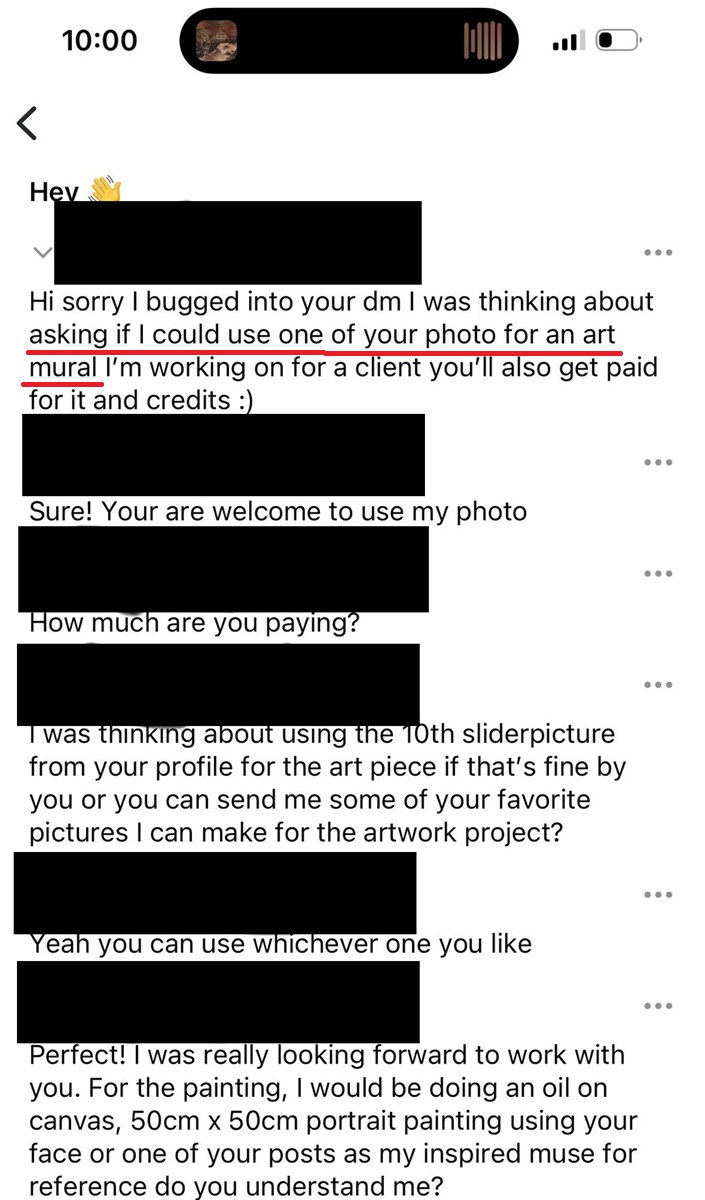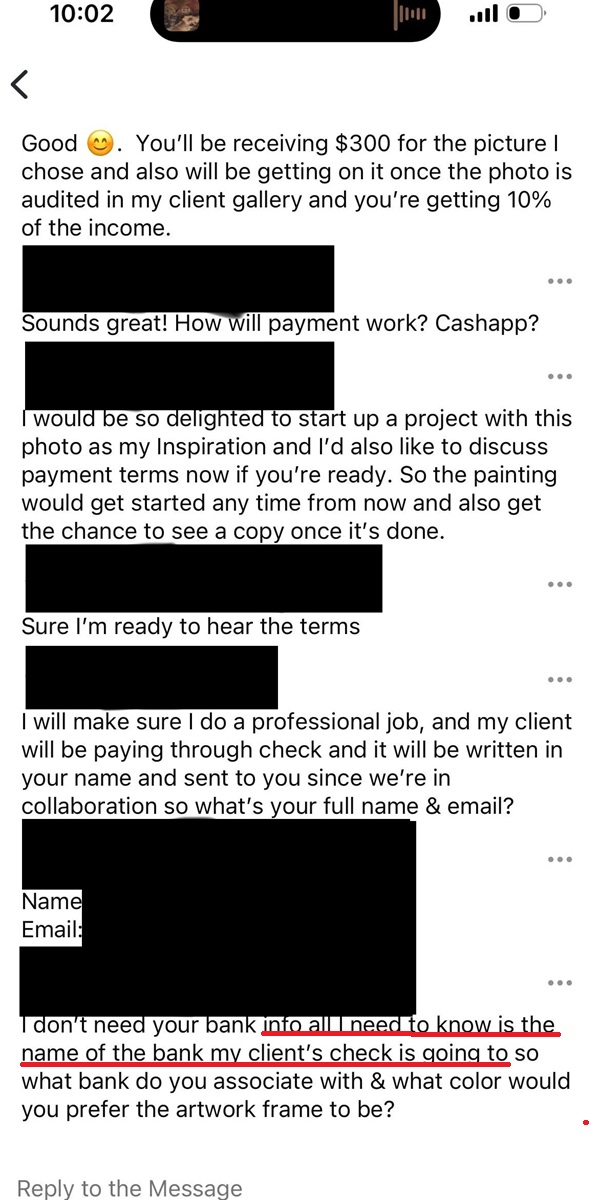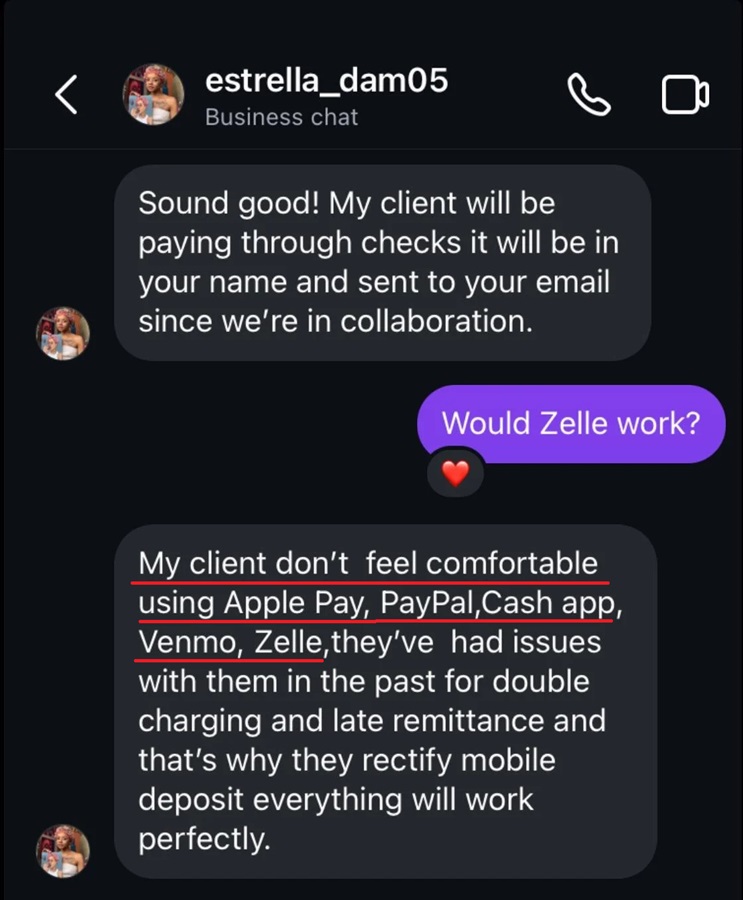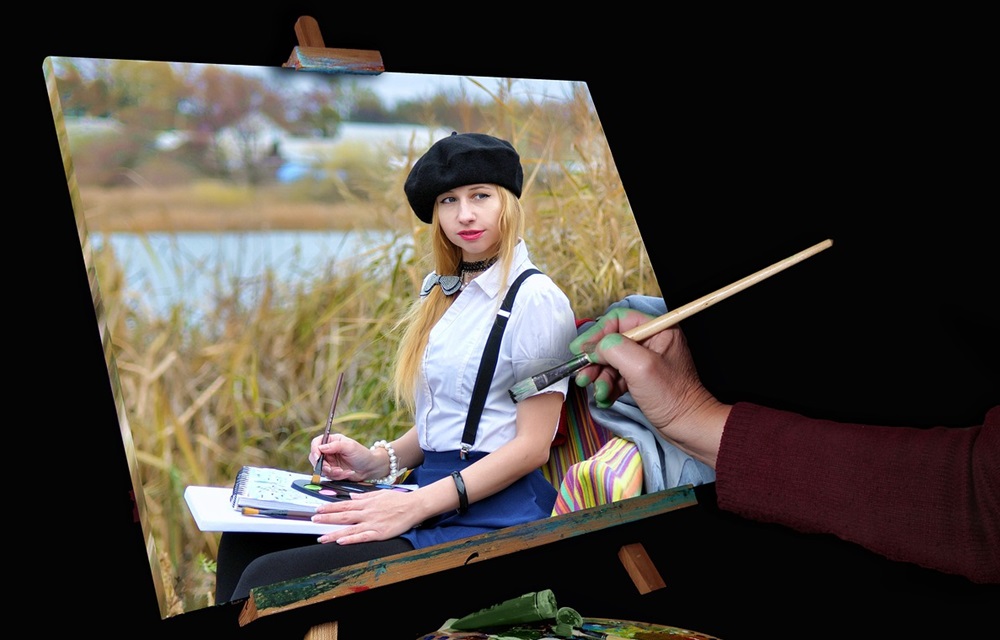Are you on social media? Learn more about the Muse Scam to stay safe online!
What is the Muse Scam?
The Muse scam is a fake check scam where scammers trick people on social media into thinking they can become models or influencers.
Scam Detectors Most Trusted Websites in Online Security
- Guard.io (100): Surf the web safely. Clean up your browser, remove malicious extensions and check for privacy violations.
- Incogni.com (100): Delete your personal data from the internet and protect against scams and identity theft.
- ExpressVPN (100) Stay secure and anonymous online - Best VPN Out There
If you have a social media account, you must be aware of this scam to stay safe online. Interacting with scammers is a waste of your time, energy, and potentially money. As you might guess, Instagram is the most popular playground for this scam.
Learn the red flags to watch for so you don’t fall for this common social media scam.
How the Muse Scam Works
There are two main variants of the Muse Scam circulating online: the overpayment or fake check tactic. and the initial fee strategy in which victims are asked to deposit an initial fee to secure the offer.
All Muse Scam attempts start with a message about how interesting and inspiring your social media photos are. Your natural reaction when you receive a compliment is to engage and say “thank you.” That’s what scammers are waiting for. Once you reply, they’ve hit their first milestone: they got your attention.
Other scammers will send you a direct message informing you that you’ve been selected for a modelling opportunity or to become a brand ambassador. Sometimes, they’ll tell you they want to use your image for an art mural or an upcoming art project or exhibition that will be featured in a well-known museum.

To make it seem legit, scammers guarantee the museum would handle the initial fee payment. But when you try to pay, you’re redirected to a malicious website impersonating the museum’s official website, specially crafted to steal your personal and financial information.
The Overpayment or Fake Check Tactic
Once they have your attention, scammers will continue to shower you with compliments and ask you to become their muse. Then, they will offer to send you a fraudulent check for your services as a muse, which typically amounts to a few thousand dollars.
Now comes the tricky part.
Scammers will ask you to pay them a small commission for their services as agents linking you to big brands. If you’re an aspiring social media influencer, you will probably jump on this opportunity and agree to pay their share. However, the check they’re claiming to send is fraudulent. You’ll end up with a negative balance once the bank’s system flags the check as false and reverses the amount.
Once you pay the money, the scammers vanish. You’re left without the funds you sent to “your new agent” and owe money to your bank.
The Artist’s Commission Tactic
If the scammers contact you to feature your image in an art project, use a picture of you in a painting, or use one of your photos in a mural, they’ll usually send a big check, ask you to keep some as payment and send the rest to the artist for supplies.
The check they gave you will eventually bounce after a few weeks. It takes about two weeks for banks to catch fake checks. When the bank takes back the money, you’re left owing the bank. Some banks may even close your account after the fake check ordeal.
How to Spot the Muse Scam
Spotting this scam can be challenging, especially if you’ve always wanted to become a social media influencer. The scammers often use fake profiles that look legitimate. They have a large following and professional photos. They usually pose as talent scouts or representatives of well-known brands to build trust.
Look for the following red flags to stay safe.
1. Unsolicited Offers
If you receive a modelling or influencer opportunity you haven’t applied for or from someone you haven’t contacted first, that should make you at least suspicious.
Real artists usually find models through local art groups or associations, not by approaching random people on social media.
2. Upfront Payments
If someone suddenly offers you a modelling opportunity but asks you to pay for materials upfront or deposit an initial fee, that’s a scam.
Genuine modelling opportunities usually don’t come with upfront fees. That’s not how agencies make their money. They earn money through commissions on work you get, not by charging fees.
Scammers will first ask for your bank name not because they need it for the check but to avoid using the same bank as the fake check.

3. Pressure to Act Quickly
Any special opportunity that pressures you into acting quickly is a major red flag. One of the most popular strategies scammers use is creating a sense of urgency to prevent you from thinking it through or doing research.
They want you to act based on your emotions, not rational thinking.
4. Threats
Some scammers may threaten to call your bank if they struggle to squeeze money from your pocket. They’ll claim your bank will close your account, and you may be unable to open a new one.
Depending on the scammers’ mood, these threats may escalate, but you should ignore them if you haven’t shared personal information such as your name or your bank’s name.
How to Protect Yourself
1. Run a Quick Background Check
Once you feel something is off, run a quick background check to learn more about the person or agency contacting you. If you can’t find verifiable contact or business information, reviews, or testimonials that confirm they offer legitimate modeling or influencer opportunities, you should block them.
2. Never Pay Upfront
Don’t pay any upfront fees for supposed opportunities. Legitimate agencies take a percentage from your earnings; they don’t ask you to pay initial fees to get modelling or influencer deals.
3. Use Trusted Platforms
Always work with well-known and reputable platforms for modelling and influencer opportunities. Read the testimonials of the people who have worked with those agencies to see if they’re a good fit for you.
Remember to trust your instincts. If something feels off or too good to be true, it probably is.
4. Avoid Checks
Be very cautious if someone wants to send you a check and tells you to send part of that money to someone else. It’s often a sign of a scam.

What to Do if Scammed
If you’ve fallen victim to the Muse Scam, the first step is to stop all communication with the scammers. Take screenshots of your conversations with them, then block and report them.
File a report with local law enforcement and the Federal Trade Commission (FTC) at reportfraud.ftc.gov. If you’ve shared banking information or processed a fake check, you should contact your bank immediately. Ask your bank to stop the payment if it hasn’t been processed yet.
Another handy approach is to update your password for the online accounts involved in the scam.
How to Report Scammers
Warn your family and friends to know about the Muse Scam to prevent them from falling victim.
You can report scammers and any suspicious activity to the platform that scammers approached you on, the Federal Trade, the Office of the Inspector General, and the FBI Internet Complaint Center by using the pages below:
- Report Instagram scams
- Report to the FTC
- Submit claim to the Office of the Inspector General
- Report to the FBI Internet Complaints Center
How To Protect Yourself More
Do you want to receive notifications about the most notorious scams on a regular basis? Subscribe to our scam alerts. You will receive periodic emails from Scam Detector with exclusive tips. Those will include info on how to prevent fraud and insights about the newest tools you can use to fight crime.
Feel free to explore additional articles on related fraud so that you know more about online security. Last but not least, if you had any bad experiences, make sure to use the comments section below to expose the scammers!
Conclusion
The Muse scam is a fake check scam. Scammers trick people on social media into thinking they can become models or influencers. To avoid this scam, be cautious of offers that seem too good to be true. Verify the legitimacy of any modeling or influencer opportunities.
Stay alert and protect yourself from scams like this. Feel free to share this article if it was helpful.

TOP 4 MUST-WATCH FRAUD PREVENTION VIDEOS
1. Top 5 Amazon Scams in 2024 2. Top 5 PayPal Scams in 2024 3. How To Spot a Scam Email in 2024- Latest Posts by Madalin Dinita
-
Art Commission Scams: How They Work and Red Flags
- -
Crypto Airdrop Scams: How to Keep Your Wallet Safe
- -
Don’t Fall for the Falling Lady Scam
- All Posts














